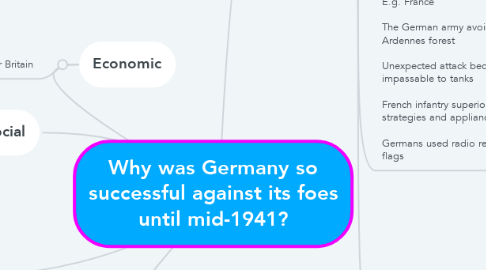
1. Social
1.1. E.g. Poland - High casualties lowered the morale of the polish fighters and created confusion
2. Economic
2.1. Mobilization was difficult for Britain
2.1.1. British empire dispersed around the world
3. Religious
3.1. Priests and religious leaders that were drafted in the army served as military chaplains that had the duty to support the religious rights and needs of the soldiers
4. Political
4.1. Allies believed that negotiations could avert the crisis
4.1.1. Poland not prepared for German invasion.
4.1.2. France insisted on Poland not mobilising in order not to provoke Germany into war.
4.2. Nazi Soviet pact
4.2.1. Ensured that Hitler would not have to fight a two-front war when invading Poland
4.3. US neutrality act
4.3.1. Germany did not yet see the force of the US as a threat
5. Military
5.1. Forces placed poorly: - rushed to defend borders instead of placed in more defensible locations along rivers - Afraid that Germany would take over industrialised territories in Poland which Britain and France would cede in order to stop the war
5.2. Polish military strategy
5.3. Phoney War – Britain and France did not intervene until 1940
5.3.1. Had France invaded Germany in 1939, following their declaration of war, Germany would have had to fight a two-front war which would have placed the country at a significant disadvantage
5.3.1.1. Gave Germans the opportunity to secure the Norwegian coast
5.3.1.2. Process of mobilisation in the British empire was slow because of how dispersed around the globe the countries in the empire were
5.4. German superior technology
5.4.1. Used to protect bombers, attack soldiers and tanks from the air
5.4.2. Tanks
5.4.2.1. Allowed blitzkrieg
5.4.2.2. Equipped with radio which allowed communication, ensuring better coordinated attacks
5.4.2.3. Supported by infantry, not the other way around like in France
5.4.2.4. French tanks lacked radio and were therefore used in small groups to support infantry
5.4.3. Fighter aircraft
5.4.3.1. Offered protection to the advancing German troops
5.4.3.2. Prevented enemy movements towards German positions
5.4.4. Radio
5.4.4.1. E.g. the Battle of the Beams - bombers of the German Air Force (Luftwaffe) used several increasingly accurate systems of radio navigation for night bombing in the United Kingdom
5.5. E.g. France The German army avoided the Maginot Line by passing through the Ardennes forest Unexpected attack because the French military planners believed it impassable to tanks French infantry superior in number + more supply lines. BUT military strategies and appliances were outdated Germans used radio receivers to communicate, French were still using flags
5.6. German strategy
5.6.1. Blitzkrieg
5.6.1.1. Avoiding heavily fortified areas, concentrating force and invading a country through the weakest entry points
5.6.1.1.1. Germany’s defeat at Stalingrad was due to the USSR’s superior tank technology
5.6.1.2. Unpredictable in nature
5.6.1.3. Included dropping Para troops e.g. during the invasion of Holland
5.6.2. Invasion of Norway
5.6.2.1. In order to protect the iron supply
5.6.2.2. +Benefit of having northern Britain in bombing range and preventing a blockade over the North Sea
5.6.2.3. E.g. Poland 225 km advancement within a week German army surrounded Poland from all sides (the invading north and south troops met in Warsaw and Brest-Litovsk)
